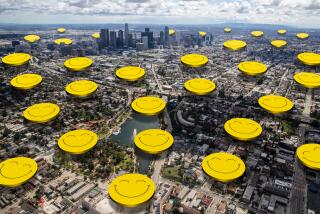California Sounds: Rush Davis offers an ode to the 105; Tom Freund says bye, Venice; and Astronautica generates Death Valley heat
Rush Davis, “Freeway 105 (featuring Taz),” (Bethel). It’s tempting to think that R&B singer Davis wrote this ode for employees of The Times, who recently relocated to a building overlooking the thoroughfare. He didn’t of course — thousands of workers roll across the I-105’s pavement daily — but Davis certainly holds it in high esteem.
“Come outside,” he pleads to a would-be lover, backing up his pitch with a promise: “I’m-a hop right back on the 105/To the beach/So we can get high.”
He’s not just talking about the physical highway. For Davis and guest seducer Taz Arnold (Sa-Ra Creative Partners), the 105 is a metaphorical bridge to the promised land. As maracas and vibraphones dance, Davis paints the road as the “stairs to the sun, the ladder to the moon.” When, a minute into the track, a heavy bass line and overall bottom-end rumble arrive, the track shoots into gear like a lead-footed street racer.
As layers of sound accrue, the Watts-raised singer moves into an extended break before Arnold steps in to seal the deal with a whispered recitation: “We are the sun and the moon, the master and the slave of our own creation” he says. “Four billion stars projected onto one ball of clay, dancing around on this beach we call life.”
In conclusion, he adds: “That heaven you seek and the hell you know are one destination behind your eyes, divided by the freeway in your mind. A bridge to freedom I like to call Freeway 105.”
Unless you’re trying to make your LAX flight during rush hour.
Tom Freund, “East of Lincoln” (self-released). Those not in L.A. could be forgiven for mistaking the title track to Freund’s new record for being about Omaha, Neb. But, no, east of Lincoln in this song is about the border boulevard in Venice, Calif., and he’s bemoaning a township overrun by tech money.
The longtime Angeleno earned early attention in the 1990s through work with Ben Harper — who makes an appearance on “East of Lincoln” — and has, over the course of his musical life, worked with artists including the Silos, Jackson Browne and Graham Parker.
A West Coast country rock song true and true, “East of Lincoln” is set as its narrator is exiting Venice to the sound of guitar and mandolin, likely priced out by the monied winners buying up the former hippie haven. “As I go east of Lincoln/I feel my heart start sinkin’,” Freund sings, bemoaning the loss before declaring, “Now I know I’m no saint/But I know when something is good and when it ain’t.” He tells of drinking, of seeing the sunset in the rearview mirror — “and the ocean swirls are just a glimmer.”
Fans of roots-oriented artists such as Tom Petty, Townes Van Zandt and Lucinda Williams will find much to explore on “East of Lincoln” — which is more important than ever now that Google’s got Venice covered.
Astronautica, “Death Valley” (Alpha Pup). A conceptually tied album that opens at sunrise and closes after dark, “Death Valley” finds the artist born Edrina Martinez crafting synth-driven beats that propel airy, wide-open textures on tracks that she says were designed for listeners to experience “while they cruise through their desert, wherever or whatever that may be for them.”
Her third studio album for Alpha Pup, which comes out Aug. 24, follows a recent residency for the soon-to-be-shuttered Low End Theory club, and it’s there that under the stage name Astronautica she started drawing eardrums attuned to the sound of beat-based L.A.
The producer likes rhythmic variety, seldom relying on repetitive house- or hip-hop-style beats in favor of surprise equations that draw on British grime, border-blurring reggaeton and Detroit techno until they’re uniquely astronautical.
On the track “Sand + Fog,” she employs finger-snapped samples, touches of high-hat driven trap music and esoteric ambient music to create a kind of veil. Then, like Elizabeth Fraser did when singing with ambient guitar band Cocteau Twins, she sings lyrics that are so woven through the other frequencies that they become less about lyrical meaning than indecipherable, but honest, emotion.
For tips, records, snapshots and stories on Los Angeles music culture, follow Randall Roberts on Twitter and Instagram: @liledit. Email: [email protected].
More to Read
The biggest entertainment stories
Get our big stories about Hollywood, film, television, music, arts, culture and more right in your inbox as soon as they publish.
You may occasionally receive promotional content from the Los Angeles Times.











